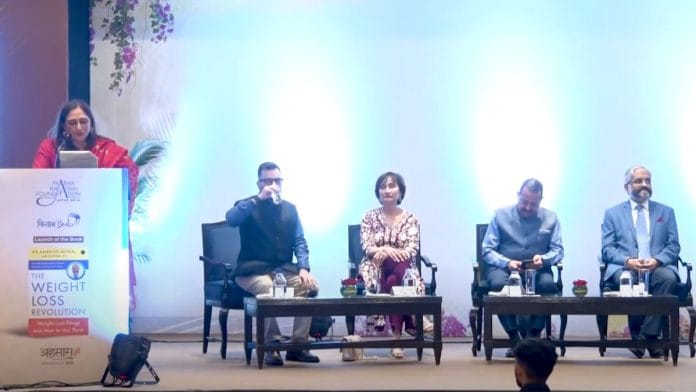New Delhi: At the launch of leading endocrinologist Ambrish Mithal’s book on obesity, co-authored with journalist Shivam Vij, the discussion turned to India’s cultural obsession with weight loss and the science behind the drugs that have everyone in a chokehold. But the question that kicked off the event at Delhi’s ITC Maurya last week captured both the uncertainty and the social media debates swirling around those promoting such drugs.
“Will you be listed among the quacks – the dieticians and gym trainers who masquerade as weight-loss experts?” journalist and columnist Vir Sanghvi asked Mithal, half-jokingly.
It was a power-packed panel: Minister of State Jitendra Singh, actor Sharmila Tagore, and HT Media chairperson Shobhana Bhartia shared the stage alongside the two authors and Sanghvi.
Mithal and Vij’s book — The Weight Loss Revolution: Weight Loss Drugs and How to Use Them, published by Juggernaut Books — describes itself as the authoritative work on Ozempic, Mounjaro and other GLP-1 drugs.
Also read: Desperate Indians want Ozempic on prescription. Huge shift from traditional drugs, say doctors
The science behind the ‘revolution’
While working on the book, Mithal sought to confront a hydra-headed demon: misinformation. The rise of GLP-1 drugs is linked to the increase in health-related conversation, media consumption, and a society in which being thin is the perennial aspiration. As a result, it’s been written and talked about tremendously.
“The media either takes it to one extreme or another,” Mithal said. “Nearly every two weeks, The New York Times has an article saying that this is the answer to the world’s problems. Then there are those who say this is a marketing gimmick. As usual, the answer lies somewhere in between.”
The book’s genesis lay in Mithal’s desire to explain the science behind what has been described as “a revolution” in the weight loss world.
Vij, Mithal’s co-writer and first obesity patient to take semaglutide — the active ingredient in Ozempic and Wegovy — said he lost 15 kgs over the past 15 months. Now, the endocrinologist has one hundred patients on Wegovy, over 500 on Mounjaro (tirzepatide), and thousands on Rybelsus.
These drugs were originally prescribed for diabetes. However, half of Mithal’s patients want to use the drug to lose weight.
“Over the years, other than lifestyle changes and invasive bariatric surgery, all other methods to treat obesity have fallen off,” said Mithal.
Also read: I was a pregnant penguin, see my before-after pics. 66-yr-old’s Ozempic to Mounjaro journey
Standing up to Ozempic-shamers
GLP-1 drugs exist in a strange, inchoate space. There’s covert acceptance, with leading celebrities taking Ozempic and the easy availability of the drug. But for the most part, there’s reluctance in terms of public acknowledgment. Moreover, its usage is met with scepticism. As Vij noted, a layer of shame surrounds those who have taken it –– because they supposedly haven’t “put in the work.”
“Yesterday’s fat-shamers are today’s Ozempic-shamers,” he said. “They’re not happy either way. When you’re fat, they’re unhappy and when you’re thin, they’re unhappy.”
The book features interviews with nine of Mithal’s patients. One of them, a 26-year-old woman, gained weight after an accident at the age of 18. She was unable to lose weight through traditional methods. Other than delving into the science, the book also appears to lift some of the stigma around the drugs –– facilitating widespread, public acceptance.
Actor Sharmila Tagore, who made it to the event via three modes of transport courtesy rain and the ensuing traffic, said that having spent her life in front of the camera, “she understands society’s obsession with bodies.”
That’s why this book comes at a critical time, as these drugs are projected to fundamentally alter this obsession.
“In a few years, everybody will be on it and everybody will be thin. That’s my prediction,” said Vij.
(Edited by Prashant)






